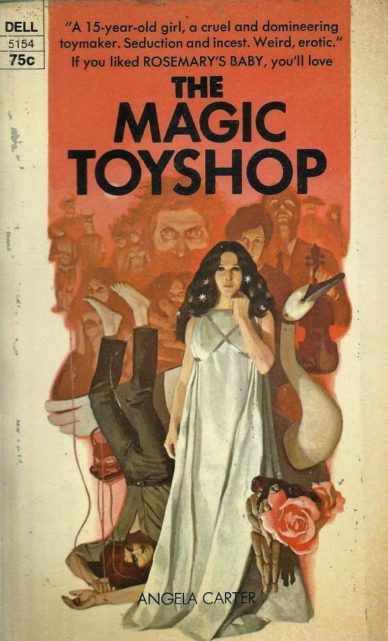 By ANGELA CARTER (Dell; 1967/69)
By ANGELA CARTER (Dell; 1967/69)
Angela Carter (1940-92) was an English feminist who wrote a number of vastly acclaimed highbrow fantasy novels like THE INFERNAL DESIRE MACHINES OF DR. HOFFMAN, THE PASSION OF NEW EVE and WISE CHILDREN. THE MAGIC TOYSHOP, initially published in 1967, was Carter’s second novel, and evinces all the qualities that would come to define her fiction, namely a love of esoteric detail and a fair amount—though not nearly enough in this case—of perverse invention.
This novel’s primary failing, in my view, is adroitly summed up by a back cover blurb stating that “Angela Carter stretches the imagination but never breaks the link with plausibility.” That’s correct, which is the whole problem: the novel contains a many surreal and picaresque elements but never goes far enough in either direction, leaving us with a fantasy narrative that’s too “plausible” for its own good, and never as compelling as the author (and her many fawning admirers) evidently believes it is. That’s an issue Carter would certainly remedy in her later novels (such as the aforementioned INFERNAL DESIRE MACHINES OF DR. HOFFMAN), but in THE MAGIC TOYSHOP she was evidently still finding her footing.
It centers on the fifteen year old Melanie, a dreamy girl living with her younger siblings Victoria and Jonathan. When their parents are unexpectedly killed in a plane accident on a business trip in America the kids are sent to live with their toymaker uncle Philip in London. This guy turns out to be an abusive lout, although Melanie does find herself enchanted by the many lifelike toys Uncle Philip creates, and also by his teenaged son Finn, with whom she enters into a romantic courtship (of sorts).
The idea of lifelike toys would seem to have endless possibilities, but Carter utilizes shockingly few of them. The book is more focused on the evil nature of Uncle Finn, who forces Melanie to work in his toyshop and perform in his private puppet shows, and the forbidding aura of his household, roiled by an unsavory secret revealed in the final pages. Not to give anything away, but I didn’t find the revelation of that secret to be especially exciting or shocking (although it might have seemed so back in 1967).
There is at least one authentically good thing about this book: the characterization of Melanie, whose sexual precociousness is presented in an entirely convincing manner with just the right amount of subtlety. But in all other aspects THE MAGIC TOYSHOP could have stood to be less subtle and more outrageous.
